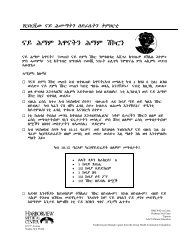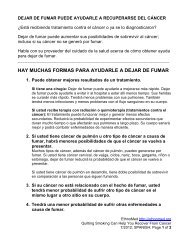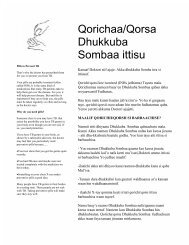Somali Knowledge Attitude Practices Study (KAPS) - EthnoMed
Somali Knowledge Attitude Practices Study (KAPS) - EthnoMed
Somali Knowledge Attitude Practices Study (KAPS) - EthnoMed
Create successful ePaper yourself
Turn your PDF publications into a flip-book with our unique Google optimized e-Paper software.
Table 2: Summary of Types of Food by Age in South and Central <strong>Somali</strong>a<br />
Child’s Age Type of Food<br />
0-6 Months B/Milk, pre-lacteal feeds, Fluid-based diet, mainly milk & water; Soft Foods<br />
- porridge, potatoes, biscuits.<br />
6-12 Months B/Milk, Milk, Soft food continues, Integration of child into family diet, solid<br />
snacks (Canjero) or soft drinks bought<br />
12-24 Months Breast milk (if mother not pregnant)<br />
Milk, family diet, (cereal-based ‘soor’ or rice/pasta with sauce; boiled<br />
maize/sorghum grains with oil & sugar). Meat consumption is rare for<br />
children<br />
After 24 Months Children eat from the family pot, 3 times a day and breastfeeding. In<br />
between the main meal, the children may be given a cup of milk, porridge or<br />
tea to drink. Breast feeding has stopped for most children in all livelihood<br />
zones except for the pastoralists who breastfeed longer than 24 months.<br />
There are no snacks in between the main meals because children are<br />
considered grown-up.<br />
Foods Prohibited for Children:<br />
Among the pastoralists of Gedo and Bakool, it was found that animal organs (liver, kidney, and<br />
heart) are not consumed by children. It is believed that children are unable to digest these foods,<br />
causing a delay in the development of verbal or speech skills in children. This is then likely to<br />
lead to deafness (Dhagol) in children if they are fed on these foods. The same belief for<br />
consumption of organ meat by children is also held by the urban communities in most parts of<br />
Southern <strong>Somali</strong>a.<br />
The agro-pastoralists of Gedo believe that consumption of sorghum, cow’s milk and mutton cause<br />
diarrhoea during hot season, hence children are not allowed to eat them during such periods. In<br />
the riverine, children are not allowed to eat boiled maize or sorghum until they are three years<br />
old. It is believed that their digestive system is not yet ready for these foods.<br />
Water, Sanitation and Hygiene <strong>Practices</strong><br />
The study found that water for domestic use and for animals is obtained from various sources<br />
among which are: wells (Muqsid), earth dams, berkards, bore holes, shallow unprotected wells,<br />
rivers Shabelle and Juba, earth pans and ponds. Although water from wells, bore holes and<br />
berkards is often treated at the source by chlorination, the water safety still remains a major<br />
concern to most communities in all livelihood zones. <strong>Study</strong> findings also revealed that most<br />
households do not treat the water for drinking at home even if it is collected from the unprotected<br />
sources or river. The riverine communities, for instance get much of their water from the rivers<br />
Shabelle and Juba as well as unprotected wells, yet most respondents in this study reported that<br />
people hardly think of treating water for domestic use. A few households from urban areas were<br />
however reported to be treating their drinking water at home. Use of bottled water for feeding<br />
infants was also reported among some urban women in attempts to avoid feeding children with<br />
contaminated water.<br />
Safe disposal of human faecal matter was reportedly poor in almost all livelihood zones. Among<br />
the pastoral and agro-pastoral communities, about 50% of the households do not have pit latrines.<br />
The children’s faecal matter is disposed off in the bush or open space. According to respondents<br />
in the study, during rainy season, much of the water sources get contaminated, causing diarrhoea,<br />
dysentery and intestinal worms. The respondents further confirmed that unprotected water<br />
25






